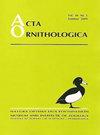Allometry of Egg Size as a Factor Influencing Egg Shape in Birds
IF 1.3
4区 生物学
Q3 ORNITHOLOGY
引用次数: 1
Abstract
Abstract. Despite a huge diversity of egg shapes among birds, similar egg shapes occur in species that differ in habitats and are not phylogenetically closely related; this indicates the presence of factors limiting the egg shape variability. We assume that one of these factors is a general pattern of egg shape change across all birds. We tested a hypothesis of allometric patterns of egg morphometric traits (radii of blunt end (infundibular zone, ri), pointed end (cloacal zone, rc), lateral zone (rl) and maximum diameter (D)) scaling against egg length (L). Phylogenetic allometric analysis was applied. We also studied hierarchical distribution of variation in egg traits at different taxonomic levels in order to determine the degree of egg shape variability on each of them. We revealed allometric patterns in the scaling of egg traits: D and ri scaled against L with negative allometry, while rc and rl were positively allometric. A high degree of covariation was observed between the length and diameter, radii of the lateral and infundibular zones, i.e. traits that are associated with the overall size of an egg, the degree of its elongation, and the shape of infundibular zone. Evolutionary correlation between L and rc was rather low. The greatest variation of egg traits resided at the level of orders. The identified general trends in egg shape variation are realized on the basis of various groups of birds in phylogenetic and ecological sense that assume the influence of these factors on the bird's egg shape.蛋大小异速发育对鸟类蛋形的影响
摘要尽管鸟类的蛋形存在巨大的多样性,但相似的蛋形出现在栖息地不同且在系统发育上不密切的物种中;这表明存在限制蛋形变异性的因素。我们假设其中一个因素是所有鸟类蛋形变化的一般模式。我们检验了卵子形态计量特征(钝端半径(漏斗区,ri)、尖端半径(泄殖腔区,rc)、侧带半径(rl)和最大直径(D))相对于卵子长度(L)的异速计量模式。应用系统发育异速分析。我们还研究了不同分类水平上鸡蛋性状变异的层次分布,以确定每个性状的鸡蛋形状变异程度。我们揭示了卵子性状缩放的异速性模式:D和ri相对于L缩放为负异速性,而rc和rl为正异速性。在长度和直径、侧面和漏斗区的半径之间观察到高度的协变量,即与鸡蛋的总体大小、伸长程度和漏斗区形状相关的性状。L和rc之间的进化相关性相当低。鸡蛋性状的最大变异存在于订单水平上。蛋形变化的总体趋势是在系统发育和生态学意义上的各种鸟类群体的基础上实现的,这些群体假设这些因素对鸟的蛋形的影响。
本文章由计算机程序翻译,如有差异,请以英文原文为准。
求助全文
约1分钟内获得全文
求助全文
来源期刊

Acta Ornithologica
生物-鸟类学
CiteScore
2.10
自引率
0.00%
发文量
14
审稿时长
>12 weeks
期刊介绍:
Publishes scientific papers (original research reports, reviews, short notes, etc.) and announcements from all fields of ornithology. All manuscripts are peer-reviewed.
Established in 1933 as Acta Ornithologica Musei Zoologici Polonici, since 1953 continued under the present title.
Published twice a year by the Natura Optima Dux Foundation under the auspices of the Museum and Institute of Zoology, Polish Academy of Sciences.
 求助内容:
求助内容: 应助结果提醒方式:
应助结果提醒方式:


